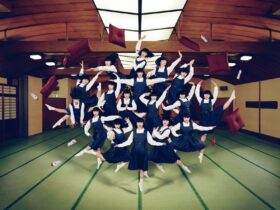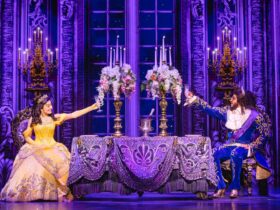Photos: Shakespeare's Globe
That includes our charmed Singapore audiences
By Wu Xueting

Any company today that wishes to put on a memorable production of Shakespeare has to offer something new. Not only have the 400-year-old plays been performed countless times all over the world, but they also invite much experimentation with the staging and interpretation.
Experimentation is key to the ethos of Shakespeare’s Globe. That doesn’t mean ignoring tradition, though. On the contrary, the theatre company goes bold and playful by reimagining many performance practices of Shakespeare’s original company during his time. The Globe shows us just how novel Shakespeare can still be today, as they return to Singapore this week and treat us to three of the bard’s iconic plays – Twelfth Night, The Merchant of Venice and The Taming of the Shrew.

Similar to how touring troupes would have done it in Shakespeare’s day, the Globe’s touring company of just eight actors juggle multiple roles in three plays, including roles of the opposite gender. Actors playing multiple parts and gender-swapping may not be new, but the Audience Choice concept is for the Globe. In a bold first for the company, the audience gets to vote for the choice of play for two shows right on the spot, by cheering for the play they want.
Tour director Brendan O’Hea explains that this concept puts a modern spin on Renaissance tradition: “The choice of a play was always left to the most powerful person in the household, who would decide the evening’s entertainment. We’ve decided to hand that power back to the audience. They’re the most powerful people in the room, so the choice of play is up to them.”
You still have a chance to experience this exciting concept at the two Audience Choice shows tomorrow, on 22 September.
You’d be in for a rollicking good time if the play popularly selected is Twelfth Night, which we caught on 19 September.

Even though it was not Audience Choice, spontaneity and audience interaction flows throughout the performance of Twelfth Night. Everyone was still chatting softly when the actors strolled into the auditorium casually from the far aisles, playing their instruments. We watched as they danced in circles on the stage, crying out chants, even having a private word or two with one another. It went on for quite a while that some in the audience went back to their phones. So there was no warning for the instant when most of the actors exited the stage, and one of those remaining put on a robe that had suddenly appeared, and music became the food of love.
From there, the pace and energy only kept climbing higher. The cast left almost no beat between scenes, the first actor sauntering on stage just as those in the previous scene turn their backs to leave it. When we realised that the woman is playing Orsino, that the man is playing Viola, or that the same woman is playing both Maria and Sebastian, we’re urged to keep up and embrace the “what you will” playfulness.

The effect is a true whirligig of time, which breezes by with much laughter and amusement. Russell Layton, Sarah Finigan, and Colm Gormley brought the house down in fits of laughter as Sir Toby Belch, Andrew Aguecheek, and Malvolio, respectively. The more vulnerable elements of the play come across in Steffan Cennydd’s sensitive portrayal of an innocent and sincere Viola/Cesario, as well as the musical interludes, where Luke Brady’s beautiful singing as Feste gave us chills.
Cennydd’s Viola/Cesario, Rhianna McGreevy’s Orsino, and Cynthia Emeagi’s Olivia shine as independent characters – in a refreshing break from our expectations of a ditsy Olivia, Emeagi’s Olivia shows that a woman can still hold herself with confidence and power while completely besotted by a pretty “boy” – but the chemistry within their love triangle felt lacking. The potential homoerotic tension between Antonio and Sebastian was also missed. In this production, the romance of Twelfth Night takes more of a backseat to the comedy.

Still, the company amazed us with the high energy true to the festive and topsy-turvy spirit of the original play. The minimal barn-like set (which didn’t even cover the whole stage), the simple use of regal robes to transform the actor from commoner to noble (while they all wear a standard cotton and lace-up boots underneath), and the mixing of characters during the singing – these unconventional theatre practices bring out the comedic and the ironic in our everyday lives and people, creating a very entertaining and stimulating experience.
What is the experience like for the company? We chatted with Director O’Hea and several cast members about the experimental practices, the responses from audiences all over the world, and more:
ADVERTISEMENTS










Leave a Reply